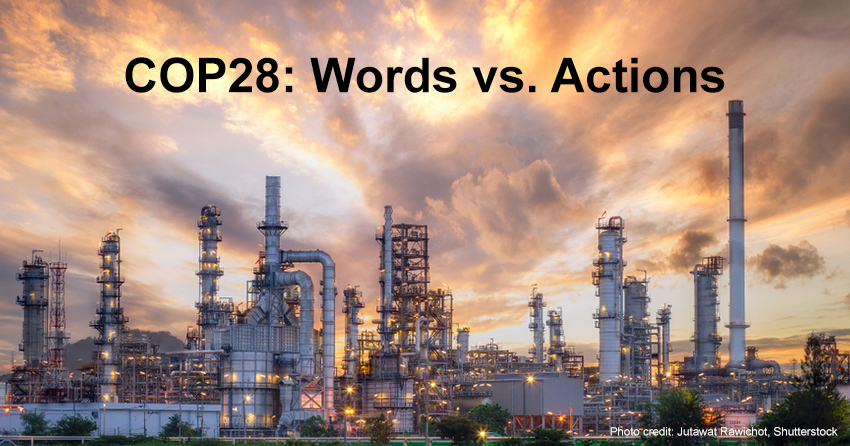
Dec 05, 2023 COP28, Climate Change, and Global Stocktake
Introduction
The twenty-eighth session of the Conference of Parties (COP28) on climate change opened in Dubai on Thursday, 30 November, and is scheduled to last until Tuesday, 12 December. Early speakers included King Charles III and President Narendra Modi, who addressed a gathering that included more than a hundred world leaders (although not Presidents Biden of the USA or Xi Jinping of China) and almost 100,000 delegates who had registered to attend the climate change summit in person. COP26 in Glasgow (see WBI story) had over 40,000 in-person registrants.
The increase in attendance reflects growing global concern about the impact of climate warming after what is likely to be the warmest year on record, with average global temperatures now about 1.3 oC above pre-industrial temperatures. The warming trend is also causing increased costs due to climate-related disasters. For example, as of November 8, the USA had experienced 25 weather/climate disaster events costing more than $1 billion in 2023. This is three times the average number.
The Paris Agreement
The 2015 Paris Agreement was drafted and opened for signature on Earth Day (April 22) in 2016. The agreement is a legally binding international treaty on climate change. Currently,194 countries and the European Union have ratified the Paris Agreement. This treaty’s primary mission was to keep the increase in global average temperature to below 2oC above pre-industrial levels and strive towards limiting the temperature increase to just 1.5oC above pre-industrial levels.
The Paris Agreement was a seminal event because most nations agreed on the significance of necessary actions to combat climate change’s adverse and potentially catastrophic effects on our world today and for future generations. As a result of the agreement, all Parties (country, state, or regional economic organization) must submit and update plans for their nationally determined contributions (NDC). These climate action plans must outline and communicate their post-2020 climate actions. The Paris Agreement also mandated a “Global Stocktake” (GST) or report card of progress in 2023 and every five years after that.
COP28 and the Global Stocktake (GST) – The Report Card
The Global Stocktake (GST) is intended to determine how effective the global response has been in achieving the goals of the Paris Agreement on the climate crisis, identifying gaps, and identifying informed paths forward. The Technical Dialogue of the first global stocktake has provided much of the scientific input to COP28 and the GST. The report utilized aggregate conclusions drawn from the individual NDC reports and additional data collected since 2021 from Parties, international bodies, and non-Party stakeholders. Technical dialogues were conducted and were important in ensuring a shared global understanding among global stakeholders of the main thematic areas of mitigation, adaptation, and means of implementation, support & finance flows, all of which should incorporate consideration of equity issues and the plan’s ambition.
The Technical Dialogue of the first global stocktake, published on September 8, 2023, has identified areas of success, opportunities, potential solutions, and significant implementation gaps on all fronts, including considerations of equity and ambition. The Technical Dialogue states, “. . . the global community is not on track towards achieving the long-term goals of the Paris Agreement, despite progress made.” The report repeatedly emphasizes the urgency of acting now.
An important outcome for the GST at COP28 is to provide relevant information to be used by Party policymakers and stakeholders to create more robust climate policies and targets for the next NDC round, due in 2025. If implemented effectively by Parties, more robust policies and increased targets should go far in identifying actions required to meet the Paris Agreement’s overarching goal to keep the global average temperature increase “well below 2OC above preindustrial levels” with a preferred outcome of only “1.5OC above pre-industrial levels.” Although increasing targets without any implementation will not help global sustainability.
Final Takeaways
If the Global Stocktake results in increased national and global ambitions to address climate change followed by immediate implementation of NDC action plans to reduce the release of greenhouse gases, then it will have been a success.
Global citizens should expect Parties, international bodies, and non-Party stakeholders, to increase the ambition of their policies and implement them immediately, and not lose valuable time fully resolving all contentious issues. Immediate steps to reduce the $1.1 trillion dollars (according to IEA) subsidizing fossil fuel use would be a good place to begin! We need fewer words and more action.
We should also recognize that small changes by many individuals can have a significant positive impact. For example, switching to eating more plant-based foods, increasing their recycling, and contributing to a less wasteful circular economy could all significantly impact. Global citizens’ greater engagement would also convey to Parties, international bodies, and non-Party stakeholders that they must step down from their pulpits and act!
“I alone cannot change the world, but I can cast a stone across the waters to create many ripples.”
~Mother Theresa


